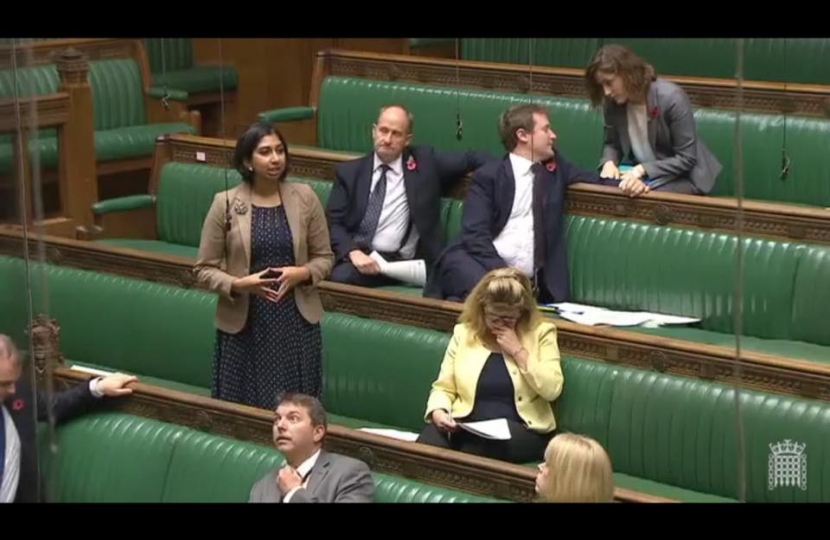
I am a Conservative because I believe fiercely in aspiration. I believe, too, that it does not matter where people start in life, what their parents did or how wealthy their family is—people can achieve their dreams and improve their life through their own endeavours, dedication and an attitude of service and community. That, for me, is real compassion, and it is no more abundantly clear than in relation to the education policies and achievements of this Government and this party.
If we look at the evidence, we realise that the Opposition have no grounds to complain. When Labour left office in 2010, two in five children were leaving secondary school functionally illiterate or innumerate—two in five, in a country with some of the best schools in the world. That is unacceptable and a scandal. Employers had lost confidence in exams because of grade inflation, and kids were made to catch up when they got to university. Thanks to the bold reforms of structures and standards, progress has been made. The free schools movement has reinvigorated the teaching profession to inject innovation and allow teachers and schools to provide the standards they want in their community.
Prior to my election to Parliament, I co-founded and now chair one of the early free schools, Michaela community school, in my home town, Wembley. We are now in our third year of opening. It is a secondary school in a run-down part of London. Pupils come from a wide of range of backgrounds—40% are Afro-Caribbean, more than 50% are on the pupil premium, nearly half speak English as a second language, and one in five has special educational needs. One third of pupils start at Michaela community school with a reading age below their chronological age; many have been thrown out of their previous schools. However, our philosophy of an academically rigorous curriculum, high expectations and zero tolerance of poor behaviour has proved popular with children and parents in the area. Every child is treated as though they have the potential to get to Oxbridge, even if some enter with low attainment and poor behaviour. We have children who make five years’ progress in reading in one year. That is because of our invigorated teachers, innovation in teaching and the standards that we apply.
Our teachers recently published a book about what makes Michaela excellent. I am going to read a story about one of our pupils, Korey, who joined Michaela community school last September:
“He is black, has special educational needs and lives on an estate. His mother and grandmother were desperate. His father was absent. His primary school said that he was the worst-behaved child they had ever seen. We happily invited Korey into Michaela.”
We are a very inclusive school. My headmistress, Katharine Birbalsingh, explained to Korey’s mother:
“how the school works, why we have silent classrooms with hard-working children, learning more than anyone would have imagined possible, even more than their counterparts at private schools.”
At Michaela we have:
“silent and orderly corridors, and lunch halls that are free from bullying, our playground where children are able to be children. It works because we do not pander to every parental whim, making exceptions in order to ‘accommodate’.”
Quality teaching is what makes the difference. Empowered heads, impassioned teachers, high standards and rigour—that is what is working in our schools. That is why we have seen progress. I pay tribute to my hon. Friend the Minister for School Standards because he has focused relentlessly and tirelessly on phonics, for example. Since the phonics test was introduced in 2012, we have seen thousands more children achieving the basic requirements in literacy, enabling them to enjoy reading. We have seen the introduction of the EBacc, an academically rigorous curriculum that is raising standards for thousands of children around the country. That is what makes a difference, and it is the Conservative party that is standing up and calling out low standards.
In our schools’ structures and standards, the Conservative party has made a massive difference in trying to remedy the failings of the Labour party in education. On grammar schools, Labour has got it wrong again. What parents like about grammar schools and what pupils cherish in those schools is exactly the point made by my hon. Friend the Member for Faversham and Mid Kent (Helen Whately)—high quality teaching, high standards, zero tolerance of bad behaviour and the cultivation of an environment where studying is valued and confidence is engendered. That is what works in schools. Why does the Labour party want to curb that and restrict a whole generation of children from accessing excellent schools, excellent teachers and innovation in our schools? The Opposition should be ashamed of themselves and they should support this policy as much as they can.
The full debate can be accessed here
